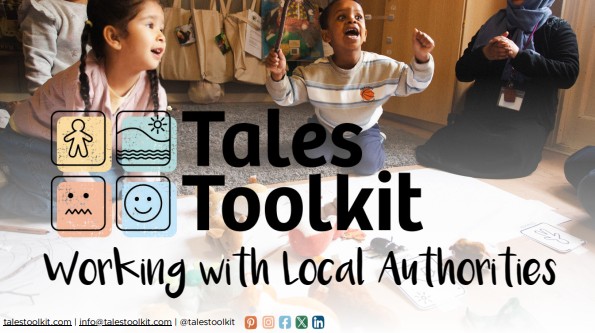Primary Schools
Using Tales Toolkit in the Early Years, KS1 and above
Many of our settings are primary schools and use TTK to support literacy and language development in EYFS, KS1 and even KS2.




Download the info pack

How Tales Toolkit works for
Primary Schools
...
The Tales Toolkit approach, while designed for EYFS, is not confined to nursery and reception classes. TTK is an effective method for supporting the development of literacy and language and communication throughout KS1 too. By using this method year-on-year, the children can build on the foundational principles set out by the Tales Toolkit approach in nursery. Practitioners find it very useful in Years 1 and 2, where narrative structure and the principles of problem-solving gain complexity.
Why do
Primary Schools
love Tales Toolkit?
- Low-to-No Plan system keeps teacher workload down.
- Tales Toolkit supports literacy and language and communication throughout EYFS and KS1.
- Train up ALL the staff across EYFS and KS1 departments with one package.
- Adaptable to big and small class sizes.
- Highly effective in settings with high numbers of EAL and SEND.
Check out a different setting
Using Tales Toolkit in Primary Schools: Enhancing Literacy and Lifelong Learning through Play
The importance of literacy in early education cannot be overstated. Literacy forms the foundation upon which academic and life success are built. Proficiency in reading, writing, and comprehension opens doors to a myriad of opportunities and lays the groundwork for continued educational achievement. In the context of primary education, innovative tools and methodologies that foster literacy from a young age are invaluable. One such tool is the Tales Toolkit, an innovative storytelling resource that employs the pedagogy of play to cultivate literacy skills while making learning enjoyable and engaging for children.
The Importance of Literacy in Early Education
Literacy is a critical skill that significantly influences a child's academic and social development. According to the National Literacy Trust, children who develop strong literacy skills early on are more likely to succeed academically and enjoy higher levels of well-being throughout their lives. Literacy skills enable children to access and engage with the curriculum, enhancing their ability to learn in all subjects. Moreover, literacy fosters critical thinking, creativity, and communication skills, which are essential for personal and professional success.
Research has shown that early literacy experiences can predict later reading success and academic achievement. A study by Hart and Risley (1995) found that the number of words a child hears by age three is a strong predictor of their future vocabulary size, reading comprehension, and academic success. Therefore, it is crucial to provide young children with rich literacy experiences to set them on a path towards lifelong learning and success.
Tales Toolkit: A Pedagogical Approach to Literacy through Play
Tales Toolkit is an innovative educational resource designed to enhance literacy skills in young children through storytelling and play. Developed by Kate Shelley, a former primary school teacher, Tales Toolkit uses a simple yet powerful framework to encourage children to create and share their own stories. The toolkit includes various resources such as story maps, character cards, and props, which children can use to invent and narrate their own tales.
The core principle behind Tales Toolkit is the pedagogy of play, which emphasizes learning through play-based activities. Play is a natural and effective way for children to learn, as it engages them in active, hands-on experiences that promote cognitive, social, and emotional development. According to the Early Years Foundation Stage (EYFS) framework, play is essential for children's development and learning, providing opportunities for them to explore, investigate, and make sense of the world around them.
Extending the Joy of Learning Beyond EYFS
While the EYFS framework recognizes the importance of play in early childhood education, the principles of play-based learning can and should extend beyond the early years into the key stages of primary education. Tales Toolkit is designed to do just that, providing a flexible and adaptable resource that can be used across different age groups and educational settings.
One of the key strengths of Tales Toolkit is its ability to make learning enjoyable and engaging for children. By involving them in the process of creating and sharing stories, it taps into their natural curiosity and imagination, making learning a joyful and rewarding experience. This is particularly important in the key stages beyond EYFS, where the pressures of the formal curriculum can sometimes overshadow the joy of learning.
Enhancing Literacy Skills through Storytelling
Storytelling is a powerful tool for enhancing literacy skills. It involves various components of literacy, including listening, speaking, reading, and writing. Tales Toolkit provides a structured yet flexible framework that supports children in developing these skills through storytelling. The toolkit encourages children to use their imagination to create characters, settings, and plots, helping them to develop their narrative skills and understanding of story structure.
Moreover, storytelling promotes language development and vocabulary acquisition. As children create and share their stories, they are exposed to new words and concepts, which helps to expand their vocabulary and improve their language skills. Storytelling also enhances comprehension and critical thinking, as children must consider the logical sequence of events and the motivations and actions of characters in their stories.
Building Confidence and Communication Skills
In addition to enhancing literacy skills, Tales Toolkit helps to build children's confidence and communication skills. By providing a safe and supportive environment for children to share their stories, it encourages them to express their ideas and opinions, boosting their self-esteem and confidence. This is particularly important for children who may be reluctant to speak or participate in class.
Tales Toolkit also fosters collaboration and social skills. Many of the activities involve group work, where children must listen to each other's ideas, negotiate, and work together to create a story. This helps to develop their ability to communicate effectively and work as part of a team.
Setting Children Up for Later Success
The benefits of using Tales Toolkit in primary schools extend beyond the immediate enhancement of literacy skills. By fostering a love of learning and storytelling, it helps to instill a positive attitude towards education that can last a lifetime. Children who enjoy learning and feel confident in their abilities are more likely to succeed academically and pursue further education and career opportunities.
In conclusion, Tales Toolkit is a valuable resource for primary schools, providing an innovative and effective way to enhance literacy skills through the pedagogy of play. By making learning enjoyable and engaging, it helps to set children on a path towards lifelong learning and success. As educators continue to seek out effective strategies to support literacy development, tools like Tales Toolkit will play an essential role in creating a bright future for all children.














